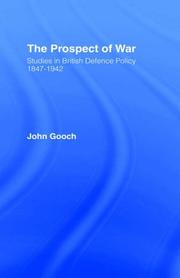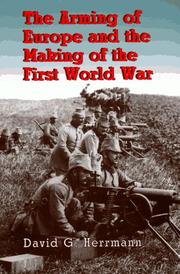| Listing 1 - 3 of 3 |
Sort by
|

ISBN: 0714631280 9780714631288 Year: 1981 Publisher: Abingdon, Oxon New York : Frank Cass,
Abstract | Keywords | Export | Availability | Bookmark
 Loading...
Loading...Choose an application
- Reference Manager
- EndNote
- RefWorks (Direct export to RefWorks)
Défense --- Curragh, Incident de (1914) --- Haldane, Richard Burdon (1856-1928) --- Grande-Bretagne --- Canada --- Grande-Bretagne --- Et la guerre --- Histoire militaire --- Histoire militaire --- Défense --- Curragh, Incident de (1914) --- Haldane, Richard Burdon (1856-1928) --- Grande-Bretagne --- Canada --- Grande-Bretagne --- 1847-1942 --- Et la guerre --- Histoire militaire --- 1847-1942 --- Histoire militaire --- 1847-1942

ISBN: 0691033749 0691201382 9780691033747 9780691201382 Year: 2020 Publisher: Princeton, NJ
Abstract | Keywords | Export | Availability | Bookmark
 Loading...
Loading...Choose an application
- Reference Manager
- EndNote
- RefWorks (Direct export to RefWorks)
David Herrmann's work is the most complete study to date of how land-based military power influenced international affairs during the series of diplomatic crises that led up to the First World War. Instead of emphasizing the naval arms race, which has been extensively studied before, Herrmann draws on documentary research in military and state archives in Germany, France, Austria, England, and Italy to show the previously unexplored effects of changes in the strength of the European armies during this period. Herrmann's work provides not only a contribution to debates about the causes of the war but also an account of how the European armies adopted the new weaponry of the twentieth century in the decade before 1914, including quick-firing artillery, machine guns, motor transport, and aircraft. In a narrative account that runs from the beginning of a series of international crises in 1904 until the outbreak of the war, Herrmann points to changes in the balance of military power to explain why the war began in 1914, instead of at some other time. Russia was incapable of waging a European war in the aftermath of its defeat at the hands of Japan in 1904-5, but in 1912, when Russia appeared to be regaining its capacity to fight, an unprecedented land-armaments race began. Consequently, when the July crisis of 1914 developed, the atmosphere of military competition made war a far more likely outcome than it would have been a decade earlier.
World War, 1914-1918 --- Arms race --- Military readiness --- Première guerre mondiale --- Course aux armements --- Armements --- Causes. --- Causes --- Première guerre mondiale --- Europe --- Arms race - Europe. --- Military readiness - Europe. --- Military readiness. --- War --- Arms proliferation --- Proliferation of arms --- Security, International --- Arms control --- Arms transfers --- Disarmament --- Armaments --- Defense readiness --- Defenses, National --- Military preparedness --- National defenses --- Preparedness (Military science) --- Readiness (Military science) --- Military policy --- Manpower --- Causes of war --- Council of Europe countries --- Eastern Hemisphere --- Eurasia --- Aehrenthal, Alois Lexa von. --- Algeciras conference. --- Austro-Hungarian. --- Belgium. --- European war. --- Franco-Russian Alliance. --- Hafid. --- Haldane, Richard Burdon. --- Italian-Turkish War. --- Krupp steelworks. --- Mogador. --- Ottoman Empire. --- Schneider-Creusot industries. --- Triple Entente. --- Verdun. --- Zipfel. --- antimilitarism. --- cavalry. --- machine guns. --- predictions of. --- quick-firing artillery. --- rifles. --- taxation. --- war plans.
Book
ISBN: 1442693851 9781442693852 1442642378 9781442642379 9781442642379 144269386X Year: 2010 Publisher: Toronto
Abstract | Keywords | Export | Availability | Bookmark
 Loading...
Loading...Choose an application
- Reference Manager
- EndNote
- RefWorks (Direct export to RefWorks)
"Viscount Richard Burdon Haldane was a philosopher, lawyer, British MP, and member of the British Cabinet during the First World War. He is best known to Canadians as a judge of the Judicial Committee of the Privy Council (Canada's highest court of appeal until 1949), in which role he was extremely influential in altering the constitutional relations between the federal parliament and the provincial legislatures. Chafing under the British North America Act of 1867, which provided for a strong central government, the provincial governments appealed to the Judicial Committee and were successful in gaining greater provincial legislative autonomy through the constitutional interpretations of the law lords. In Viscount Haldane, Frederick Vaughan concentrates on Haldane's role in these rulings, arguing that his jurisprudence was shaped by his formal study of German philosophy, especially that of G.W.F. Hegel. Vaughan's analysis of Haldane's legal philosophy and its impact on the Canadian constitution concludes that his Hegelian legacy is very much alive in today's Supreme Court of Canada and that it continues to shape the constitution and the lives of Canadians since the adoption of the Canadian Charter of Rights and Freedoms."--Jacket.
Constitutional law --- Statesmen --- Constitutional history --- Constitutional limitations --- Constitutionalism --- Constitutions --- Limitations, Constitutional --- Public law --- Administrative law --- Philosophy. --- Interpretation and construction --- Hegel, Georg Wilhelm Friedrich, --- Haldane, Richard Burdon Haldane, --- Hegel, Giorgio Guglielmo Frederico --- Hegel, Georg Wilhelm Friedrich --- Influence. --- Canada. --- Supreme Court of Canada --- Haldane, R. B. Haldane --- Haldane, --- Canada --- Histoire constitutionnelle. --- Hēgeru, --- Hei-ko-erh, --- Gegelʹ, Georg, --- Hījil, --- Khegel, --- Hegel, G. W. F. --- Hegel, --- Hei Ge Er, --- Chenkel, --- Hīghil, --- הגל, --- הגל, גאורג וילהלם פרידריך, --- הגל, גיאורג וילהלם פרידריך, --- הגל, ג.ו.פ, --- היגל, גורג ווילהלם פרדריך, --- היגל, גיורג וילהלם פרידריך, --- 黑格尔, --- Hegel, Guillermo Federico, --- Hegel, Jorge Guillermo Federico, --- Heyel, Georg Wilhelm Friedrich, --- Higil, Gʼūrg Vīlhim Frīdrīsh, --- هگل, --- هگل، گئورگ ويلهم فريدريش,
| Listing 1 - 3 of 3 |
Sort by
|

 Search
Search Feedback
Feedback About UniCat
About UniCat  Help
Help News
News